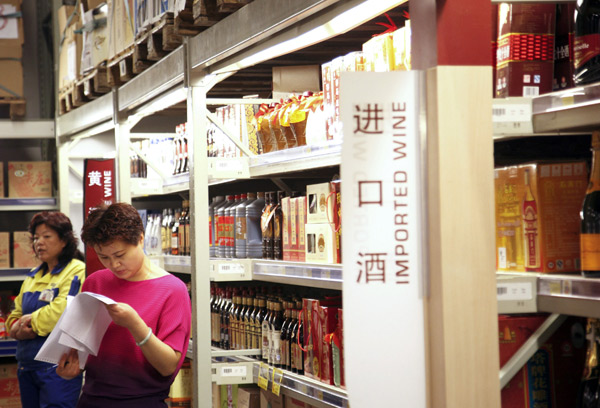Economy
Imported foods gain favor with Chinese buyers
Updated: 2010-12-23 07:56
By Meng Jing (China Daily)
BEIJING - Wu Ying is determined to have a fancy Christmas in the southern city of Shenzhen this year, including a home-baked Christmas cake with ingredients imported from the United States.
|
 Staff members work in the imported wine department at a Metro AG supermarket in Shanghai. Shopping website Ourtasty.com said Belgian chocolates and French wines are its top sellers over Christmas. [Photo/Agencies] |
It has been a year since Wu graduated from Purdue University, so she plans to reinforce her memory about the "cheerful and romantic" time by baking a genuine American cake.
Wu, 25, is not the only person eager to pursue a Western lifestyle -- or rather, food -- in China.
| ||||
Grace Guo, chief operating officer with the Shanghai-based company, said Belgium chocolates and French wines are its top sellers over Christmas.
The company is not only eyeing the booming Christmas market, but also the huge demand for imported food in China.
"Imported food is getting more and more popular in China, with or without Christmas," she said.
Guo said more young Chinese are willing to try exotic foods, as some have concerns about China's food safety record.
When the company began in December 2008, it could get only a dozen orders a day. "But the number of our daily orders has reached 1,000 and our daily turnover is about 250,000 yuan ($37,000)," Guo said.
The company sells about 3,000 kinds of imported foods, with 60 percent from the US. Compared with its European counterparts, food from the US can be relatively cheap.
Among its top sellers are nuts such as pistachio and sauces from the US, cookies and pasta from Europe and milk powder from New Zealand.
"We plan to bring another 7,000 kinds of foreign food to the Chinese market. There is a lot of good stuff out there," Guo said, adding that her company's goal is to have a daily turnover of 600,000 yuan next year.
Lin Wei, founder of China's first imported wholesale food website, said he saw a two-fold growth every year in imported food sales since entering the industry in February 2007.
"China's potential as a food-importing country is vast and it will continue to expand along with the rapid growth of China's middle class," Lin said.
"A 200g package of imported cookies can be priced at 40 yuan while domestic ones usually sell for less than 5 yuan. You can imagine the purchasing power I'm talking about."
E-paper

Ear We Go
China and the world set to embrace the merciful, peaceful year of rabbit
Preview of the coming issue
Carrefour finds the going tough in China
Maid to Order
Specials

Mysteries written in blood
Historical records and Caucasian features of locals suggest link with Roman Empire.

Winning Charm
Coastal Yantai banks on little things that matter to grow

New rules to hit property market
The State Council launched a new round of measures to rein in property prices.




